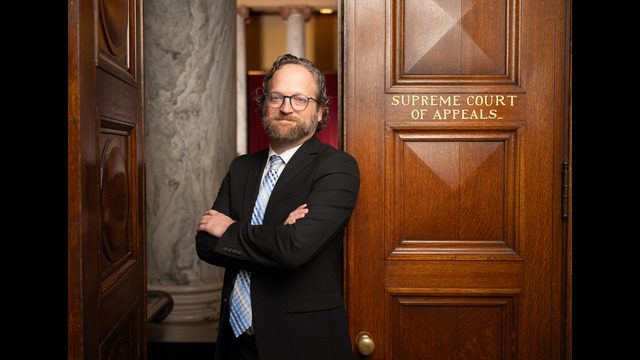CHARLESTON, WV (LOOTPRESS) – The Supreme Court of Appeals of West Virginia today announced Deputy Administrative Director Keith Hoover will become Administrative Director for the state’s unified court system effective Jan. 1, 2025.
Hoover will replace Joe Armstrong, who is retiring Dec. 31. Armstrong has served in the role since 2019.
“My fellow Justices and I appreciate the outstanding work Joe has done as the Administrative Director,” said Chief Justice Tim Armstead. “He began his role at a challenging time for our courts. He helped to shepherd the court system through the COVID crisis and assisted in implementing the Intermediate Court of Appeals. We will miss working with him, and we wish him the very best as he transitions to a much-deserved retirement.”
A Hurricane native, Hoover is a graduate of West Virginia Wesleyan College and the West Virginia University College of Law. He practiced law for ten years in Charleston before coming to work at the Supreme Court Administrative Office as Counsel in March 2019. He was promoted to co-Deputy Administrative Director in January 2021 and has since served as the judiciary’s liaison with the West Virginia Legislature and the executive branch.
“Keith is a respected leader and has shown tremendous initiative in addressing the challenges our court system faces each day,” Chief Justice Armstead said. “In his role of legislative liaison, he has provided key input and worked cooperatively with lawmakers to improve our legal system. My fellow Justices and I believe Keith will provide innovative and effective leadership of the Administrative Office and help improve the operations of our judicial system across the state.”
Internally, Hoover has also led many of the Court’s special projects, including development of the judiciary’s first strategic plan, which was completed in November 2023. As Administrative Director, he will assist the Court in implementing the strategic plan, which is part of the Court’s ongoing emphasis to improve efficiency, accountability and transparency.
“I am honored by the faith the Court has in me, and I look forward to helping the judicial system continue to provide a fair and impartial court system for the citizens of West Virginia,” Hoover said.
The Administrative Director position is created by the state constitution and appointed by the Justices of the Supreme Court. The Supreme Court’s Administrative Office supports the state’s unified court system, which includes the Supreme Court, Intermediate Court of Appeals, and the circuit, family and magistrate courts operating in all 55 counties. It aids the approximately 1,600 judicial officers and employees working across the state.
“Our mission in this Office is to serve the people of West Virginia and inspire their confidence in the judiciary by equipping our judicial officers and staff with the information and resources they need to operate a highly effective, efficient and transparent court system,” Hoover said.
To better achieve that mission, and with approval from the Supreme Court, Hoover is reorganizing the structure of the Administrative Office to streamline and improve its operations.
Under the existing structure, the Office had a number of individual divisions all reporting independently to the Administrative Director. Those will now be consolidated into three groups to better organize their functions: the Court Operations Group, Court Services Group and the Policy and Strategic Implementation Group.
Current Co-Deputy Administrative Director Evan Lynch will become Chief of Court Services and will supervise the Court Services Group, which will oversee circuit courts, family courts, magistrate courts, probation, grants and special projects.
Current Administrative Office Counsel Bradley Schmalzer will become Chief of Court Operations and will supervise divisions that handle technology, facilities, finance, legal issues, human resources, security and the Law Library.
Hoover will directly oversee the Policy and Strategic Implementation Group, which will handle policy development, legislative affairs, judicial education, statistics and communications.
“We believe these changes will more vertically organize our Office and better focus our operations, improving how we serve the judiciary and public through the Court’s strategic priorities,” Hoover said. “Meanwhile, we will continue to review best practices and find new ways to boost transparency, efficiency and modernization throughout the judicial branch of government.”
Hoover’s appointment and the reorganization will become effective Jan. 1, 2025.










